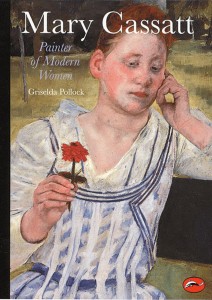
Pollock, Griselda
This study redefines the American artist Mary Cassatt’s status in the Parisian avant-garde and in American art, placing her work in the wider context of 19th-century feminism and art theory. Cassatt’s art explores a “new woman’s” perspective on the spaces of modernity: at the theatre, in the drawing-room and garden, in the studio. Admired by Degas – who invited her to show with the Impressionists in 1877 – Cassatt’s work reveals her profound study of old masters and keen responses to contemporary French and Spanish painters. Pollock emphasizes Cassatt’s interest in Manet and her influence on American collections of French modernism. She also argues that Cassatt’s experimentation with etching and pastel from the late 1880s enabled her to represent children and women without sentiment but with a deepening awareness of a complex psychological charge.
“Just wonderful paintings by a great role model.”— reviewed by RR.
Buy Here